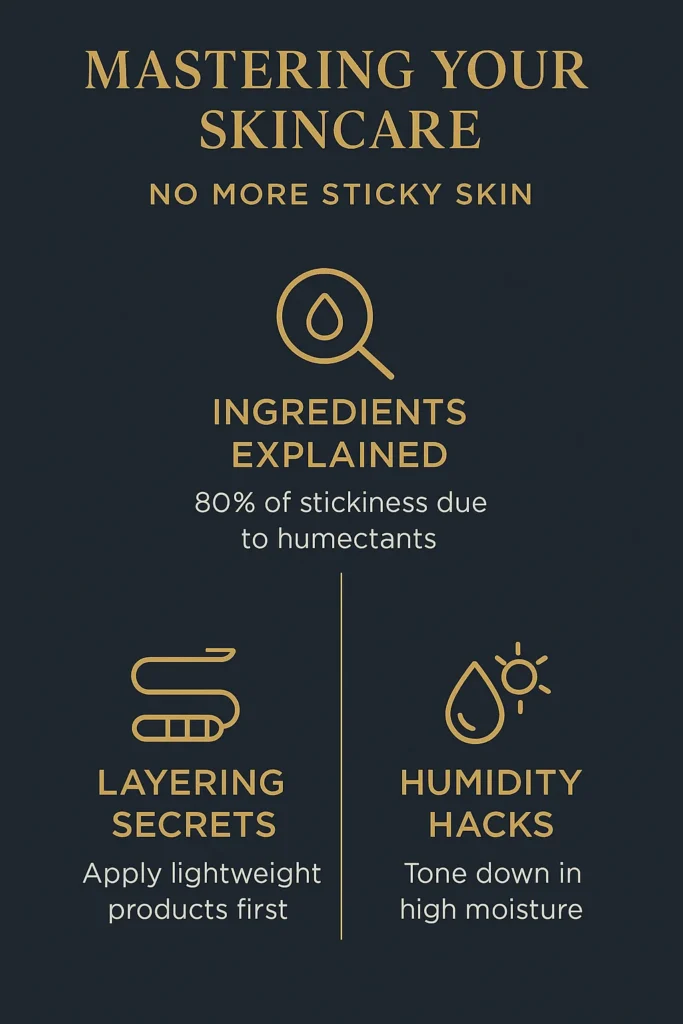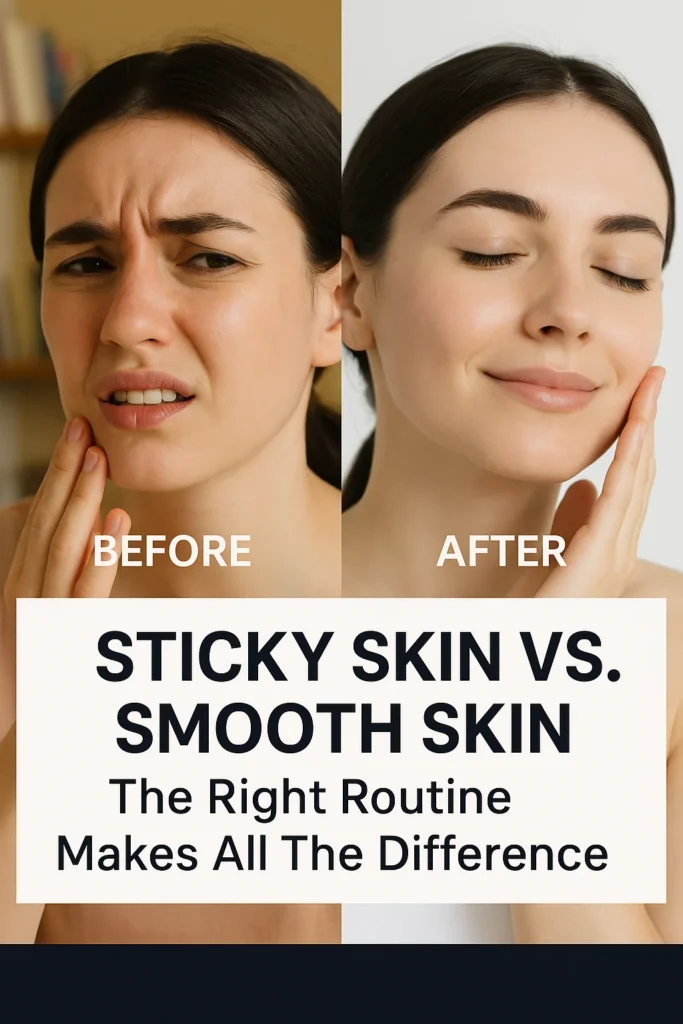Sticky skin after applying skincare products often comes from certain ingredients, how you layer products, or even the weather. It usually means your skin is holding onto moisture well.
In a Nutshell: Sticky Skin Post Skincare
- You will learn why your skin might feel sticky after using products.
- You will understand how product ingredients and layering affect this feeling.
- You will get simple tips to avoid unwanted stickiness.
Estimated reading time: 5 minutes
Ever wonder why your face feels a bit tacky after your skincare routine? That sticky feeling can be confusing. It might be a sign your products are working, or it could mean you need to adjust your routine.
Why Your Skin Feels Sticky Post Skincare
Sticky skin, or a tacky feeling, often means your skincare products are doing their job. It is different from oily skin. This feeling comes from how certain ingredients work with your skin.

1. Product Ingredients and How They Work
Many good skincare products use ingredients that make your skin feel a little sticky on purpose. These include:
- Humectants: Like glycerin or hyaluronic acid. They pull water into your skin. This makes your skin feel moist and slightly sticky.
- Polysaccharides: These are sugars that can form a thin film.
- Film-formers and Polymers: These create a light layer on your skin. This layer helps lock in moisture or active ingredients.
This sticky layer can actually help your skin absorb the next product better. Christine Byer Esthetics notes that a sticky feeling often means a product is designed to leave an adhesive layer. You should then follow with a moisturizer to smooth it out. In K-Beauty, sticky layers help products soak in better. Why does my skin feel sticky after applying products?
2. How You Layer Your Skincare
The order you put on your products really matters. Using them in the wrong order can leave your skin feeling tacky. A good layering order is:
- Cleanser
- Toner or Essence
- Serums or Treatments
- Moisturizer (this is your final step)
If you skip the moisturizer, serums might not fully settle. This can leave a sticky feeling. Users who finish with a serum instead of a moisturizer often notice lasting stickiness.
3. Products Not Right for Your Skin Type
Sometimes, products are just too heavy for your skin. This can cause stickiness.
- Thick creams might feel sticky on oily or combination skin.
- Gel-based or water-based products often feel lighter. They absorb faster.
Glam suggests that sticky feelings can mean a product is too thick. They recommend lighter, gel- or water-based moisturizers for oily skin. It is important to pick products that fit your skin’s needs. Possible Reasons Your Face Feels Sticky After Your Skincare Routine
How Weather Affects Sticky Skin
4. Humidity and Environmental Factors
The air around you plays a big role.
- High humidity means a lot of moisture in the air. This moisture can mix with your skin’s natural oils. This can make your skin feel oily and sticky. It can also clog pores.
- A 2024 study shared by Stadler Form explains that high humidity makes skin feel sticky and clammy. It can also make skin problems like acne worse. How Does Humidity Affect Skin Care?
- Low humidity usually makes skin dry. It rarely causes sticky feelings.
Medical Reasons for Sticky Skin
Sometimes, sticky or clammy skin is not about skincare. It can be a sign of a health issue.
- Too much sweating (Hyperhidrosis): This can be from heat, stress, or a medical problem.
- Heart issues: Conditions like a heart attack can make skin feel clammy.
- Low blood sugar or panic attacks: These can cause sweating and damp skin.
- Infections: Fevers from illnesses can make your skin moist.
- Other causes: Menopause or heat exhaustion can also cause sticky skin.
If your sticky skin lasts a long time and you have other symptoms like dizziness or chest pain, see a doctor. Sticky Skin: Causes, Symptoms, and Treatment
- Layer Right: Always end your routine with a moisturizer. It helps seal in earlier products.
- Match Your Skin: Use lighter, gel-based products if your skin is oily.
- Check the Air: In humid weather, switch to lighter moisturizers.
- Don’t Overdo It: A little product goes a long way. Use less if skin feels too sticky.
How to Fix and Prevent Sticky Skin
You can often prevent sticky skin by changing your routine.

Adjust Your Skincare Routine
- Use products in the right order: Always cleanse, then apply lighter products like essences and serums, and finish with a moisturizer. This helps products sink in. You can learn more about the basics of skincare here.
- Pick products for your skin: If you have oily skin, choose light gels. For dry skin, richer creams are fine. Find tips for oily skin here.
- Don’t skip moisturizer: Serums alone might leave a sticky feel. Moisturizer helps seal everything.
Check Your Products
- Look at expiry dates: Old products can change texture and become sticky.
- Try lighter ingredients: Use serums with hyaluronic acid. Follow with oil-free moisturizers.
Think About the Weather
- High humidity: Use lighter lotions or mattifying products.
- Dry climates: Richer creams are okay. But avoid too many layers in humid places. How Does Humidity Affect Skin Care?
Keep Your Skin Clean
- Cleanse well: This stops oil and dead skin from building up.
- Exfoliate gently: This helps clear pores. Do not exfoliate too much. This can hurt your skin barrier.
Lifestyle Choices
- Manage stress: Less stress means less sweat that can make skin sticky.
- Stay hydrated: Drink enough water. Eat well. This helps your skin work its best.
- Watch for health issues: If sticky skin keeps happening for no clear reason, talk to a doctor. Sticky Skin: Causes, Symptoms, and Treatment
Is Your Skin Sticky? Check This List!
Check the boxes that apply to find common reasons for sticky skin.
Conclusion
Sticky skin post skincare usually happens because of product ingredients, how you apply them, or the weather. Often, a slight sticky feel means your products are working well. They are hydrating and protecting your skin. But sometimes, it can be from wrong products, bad layering, or even health issues.
Knowing why your skin feels sticky helps you fix it. This can make your daily skincare routine much better.
Your Questions About Sticky Skin Post Skincare Answered (Simply)
Why does my face feel sticky after skincare?
Is sticky skin a sign of good skincare?
What ingredients make skin sticky?
How can I stop my face from feeling sticky after moisturizer?
Does humidity cause sticky skin?
Can sticky skin be a sign of a health problem?
Should I use less product if my skin feels sticky?









